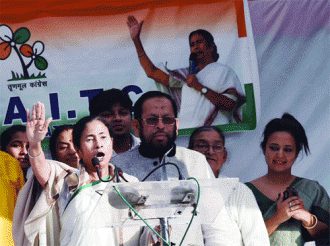‘CAMPAIGNERS’ AGAINST GRAFT LEFT DISCREDITED
- By : Anirban Ganguly
- Category : Articles

While some propagate their concern for the poor because of political reasons or simply because it is fashionable, Prime Minister Modi has consistently striven for the empowerment of the underprivileged
In a little over 24 hours after he called for a feedback, over five lakh people responded to Prime Minister Narendra Modi’s call and proffered their views on the move of demonetisation; within a 100 hours the number increased to over 10 lakhs. In a truly participative exercise, Prime Minister Modi reached out to the people directly and asked them to discuss his efforts at eradicating black money and corruption through this move.
The respondents overwhelmingly supported the move, saying it was necessary for comprehensively tackling corruption at various levels and for making the economy robust and resilient in the long run. This direct outreach has demonstrated the faith that people at large have in the Prime Minister and in his move to cleanse the economy. They are willing to put up with inconveniences and roundly support the effort. With the Prime Minister’s Office closely monitoring the evolving situation, the responsiveness of the Government to suggestions is distinctly visible on the ground as well. There is a fundamental difference when the Prime Minister Modi reaches out: He is also conscious of the need to listen, to elicit feedback and, therefore, keeps his ear to the ground. In fact, for years and decades, during his preparatory phase as a peripatetic swayamsevak, he had internalised this habit — of keeping his ear to the ground.
Ironically, those political parties and leaders who have made great capital in the name of fighting corruption and who have in the past, periodically called for cleansing public life and earned various sobriquets and laurels are the one who are howling most and loudest against this onslaught on black money and that too in the name of the ‘common people’. Take the case of West Bengal Chief Minister Mamata Banerjee; she has been rabble-rousing the streets of Delhi ever since the announcement of demonetisation was made. She professes to speak for the ‘common people’ while aiming her tantrums at the Prime Minister, who has himself said that this move is aimed at empowering the marginalised. Leaving her safe and predictable confines of Kalighat, Banerjee conducted a week long ‘jatra’ on the streets of Delhi, her own version of the ‘nukkad-natak’, all in the name of — as the communists habitually do — the ‘common people’. However, when it comes to scams, when it comes to putting together an actual mechanism for an “organised loot” of the hard earned savings of the “common people” of her State, Mamata Banerjee has out-excelled many.
It would be useful to recall that as Chief Minister, she presided over the Saradha chit fund scam, a racket of gigantic proportions of nearly Rs2,460 crore. A number of her political and social associates were involved in the Saradha issue and were in the know of the developments. The Saradha chit fund scam left a trail of deaths, suicides, especially among poor agents and poor farmers, and robbed a large number of their savings. Banerjee did not take to the streets then, choosing to remain silent or to distance herself from it all. So organised was her syndication of this loot, that her acolytes and party-sheltered corporate lumpens ensured that even her third grade paintings were overpriced and forcibly sold. While Saradha left a trail of death, Banerjee continued, Nero-like, to wield the paint-brush on her easel mounted canvas.
She did not, then, take out processions in support of the poor or the ‘common people’ in whose name she has built a career in politics. Banerjee also has a distinct and ineradicable habit — that of betraying and very often dumping and cold-shouldering those who have either abetted or condoned her political sins. Her opportunism and ruthlessness has seen her erstwhile collaborators in ‘organised looting’ — Sudipto Sen, Kunal Ghosh and Madan Mitra — break and sink. ‘Didi’ never came to their rescue; instead she ensured that they could never float up to sing the truth.
The same has been the case with those who have once politically aligned with her or had a major role to play in her political rise. Take the case of how she treated the late Ajit Panja and Pankaj Banerjee. Many among her own flock helplessly suffer her, under acute duress and mental stress.
Even at the level of governance, Banerjee has largely failed. She has, for example, been acutely insensitive to the plight of the tea garden workers in north Bengal. Conservative estimates point out that over 70 recorded starvation deaths have already occurred in the tea gardens in her tenure and each time she has either chosen to ignore or argue herself and her administration out of it. Starvation, penury, malnutrition and lack of access to medical facilities have led to these deaths and yet, despite being in power now for over five years, she has done precious little to alleviate the suffering and to improve the status of the tea garden workers. Her ‘common people’ in essence comprise only of her party lumpens who need her constant nurturing and hectoring so that they can carry on with her version of the ‘people’s revolution’. Her concern for the poor is mere political posturing and eyewash.
This time, in course of her anti-demonetisation drive, Banerjee has emerged as the chief Guignol of the protesting pack, ably assisted by Arvind Kejriwal and Congress’s ‘articulate’ vice president Rahul Gandhi. Her much touted Bharat Bandh — she disowned it in her inimitable style — has fizzled out and with it her pipe dream of occupying the seat of power in Delhi, has also received a huge jolt. Of course, be it noted, that except for herself, no one really takes her Delhi dream seriously.
The Left Front rule in West Bengal had also been equally disastrous under which the ‘common people’ suffered most — with the breakdown of rural infrastructure, industry, healthcare and education.
While some propagate their concern for the poor because of political reasons or simply because it is fashionable to do so, Prime Minister Modi has consistently and constantly striven for the empowerment and inclusion of the marginalised. In fact his governance and policy focus has been to realise that objective.
Professing to work for the empowerment and uplift of the poor, while opposing policies and efforts that actually ensure their empowerment, is not only not ethical politics, it is not wise politics either. Those who overlook this reality will in the long run be politically rejected or politically dead.

















